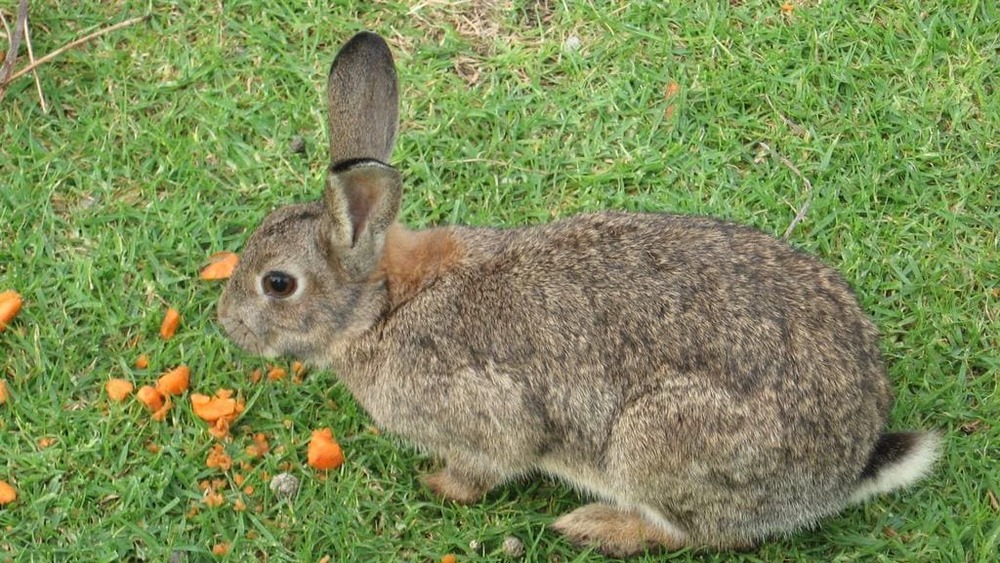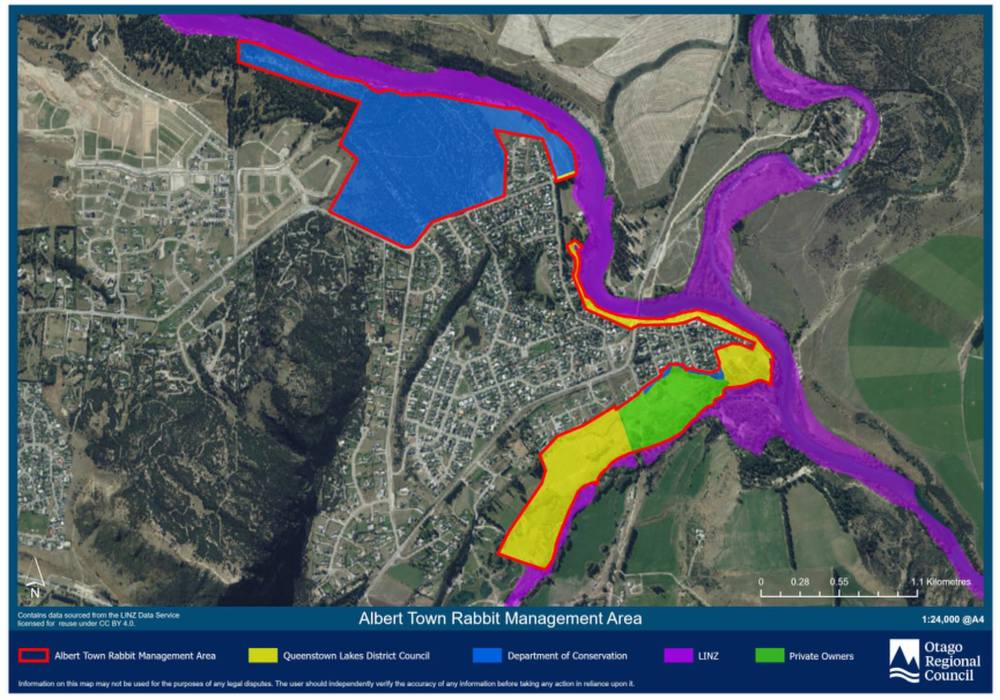Pindone poison: a perennial project
Sue Wards
11 August 2021, 6:08 PM
 Warning signs are erected up to a month before bait is laid. PHOTO: Wanaka App
Warning signs are erected up to a month before bait is laid. PHOTO: Wanaka AppThere are multiple rabbit control operations underway in the Upper Clutha, and difficulty finding clear information on where poison is laid, reports of bait being laid illegally, and reports of multiple dog poisonings are causing anxiety among dog owners.
The Department of Conservation (DOC) and Queenstown Lakes District Council (QLDC) have hired a contractor to lay pindone poison near the Wanaka and Albert Town areas.

Vet Life veterinarian James Vincent told the Wanaka App the practice has seen “quite a few cases” of dogs brought in after ingesting pindone, an anticoagulant drug used to poison rabbits.
“Over the last month we’ve seen about 15 cases total, so on average a few cases a week,” he said.
James said he thinks part of the problem is there are multiple parties laying pindone, and information on all the areas is not collated into one source, and “adequately distributed”.
“And some people are placing bait without being aware of the consequences. People need to remain vigilant out there and keep their dogs in control,” James said.

Rabbit control operations will continue to be a regular occurrence. PHOTO: Supplied
A pest specialist’s take
However, one local expert says residents can expect to get used to such operations, which operate with “a large safety margin”.
The Wanaka App spoke to Peter Preston, who’s been in the business of killing rabbits since the late 1970s and has undertaken “thousands” of rabbit control operations around Central Otago.
His advice is for people not to be too worried, as dog owners can follow some simple steps to mitigate the safety risks.
“There is a large safety margin,” he said. “If you are a responsible dog owner and you have your dog on a leash and under your voice control it’s not a problem.”
His business, Preston Pest Control, contracts to corporate clients such as the DOC, QLDC, and LINZ, as well as private landowners.
Rabbits are now closer to urban areas so there is more interaction with the public during operations, Peter said.
“Unfortunately these kinds of operations will happen more and more over the next ten years.”
Otago is the most rabbit-prone province in New Zealand, and the most rabbit prone area in Otago is Central Otago, he said.
“It is one of the major emerging issues in Otago, and it’s an issue that’s not going to be solved easily.”

Animal pest specialist Peter Preston says there is “a large safety margin” around pindone. PHOTO: Wanaka App
Informing the public
Peter puts up warning signs up to a month before bait is laid, to raise awareness of the operation. He only writes the date of when the poison is laid on the sign when he is about to lay the bait, as the operations are weather dependent.
Unfortunately, someone has been writing inaccurate dates on some signs, he said.
The signs will remain in place for several months and will not be removed until the area is considered safe.
Peter said one map showing all the areas of poison would be out of date before it was published.
But the multi-agency pindone operations are still leaving some dog owners feeling confused about where they can safely walk their dogs.
QLDC councillor Niamh Shaw, who is also a dog owner, said the council could have used technology better to communicate with dog owners.
“We could have pulled off all the email addresses of dog owners to advise them there has been a lot of bait laying and keep an eye on signs on public tracks; here’s the number if you have questions; and here’s what to do if your dog has swallowed bait.”
“It is a very complex operation - it’s always challenging,” she said.
Niamh said there will be a debrief with the major stakeholders after the operations have been completed and she has already raised some concerns.

There are a range of different land owners involved in the Albert Town operation. IMAGE: Supplied
Illegal poison bait drop
QLDC said this week it had received reports of illegal poison bait drops close to the track running from Bremner Bay to Beacon Point.
“We are working to remove these baits, but in the meantime we recommend dog owners keep dogs on a leash to avoid them eating baits and becoming sick,” the council said in a statement.
Peter said this was pindone cereal pellets dispensed in a bait station by a private landowner. The crunchy pellets are attractive to dogs, and the pellets are about 50 per cent stronger than the bait in carrots.
Peter emphasised that pindone bait on public land is always dispensed in carrots, and dyed bright green.
Signs to watch out for
James said there are a few different classifications of rodenticides, and pindone - as a first generation rodenticide - is not as dangerous as others. It breaks down more quickly and more doses are required.
“Keep an eye out for those signs - there are different kinds of poisons out there, 1080 and brodifacoum (typically used on private property or large reserves), which are worse than pindone.”
A dog would have to “eat a few dead rabbits to get the same dose as eating a carrot”, he said.
James recommends bringing dogs in for a consultation if their owner thinks they have ingested pindone.
“The bait doesn’t kill immediately - it takes a few days to take effect. You need to have them vomit within four hours at the very latest.”
James said things to look out for include signs of bleeding (this would be a minimum of three days after ingesting poison), such as visible blood in vomit or faeces (which can look black or tarry), sometimes blood in the urine - an orange hue or red; or pin prick red marks on the dog’s gums.
Ongoing operations
The QLDC website provides information and maps about the current operations.
A QLDC spokesperson said a final treatment around Waterfall Creek is scheduled for Friday. The Albert Town (north) operation is due a second bait drop later this week or on the weekend. Baiting at Albert Town (south) including the Clutha outlet should begin next week and run for around three weeks.
All timings are variable to allow for weather conditions.
Further information about rabbit control toxin can be found on the ORC website.





